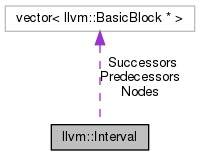Interval Class - An Interval is a set of nodes defined such that every node in the interval has all of its predecessors in the interval (except for the header) More...
#include "llvm/Analysis/Interval.h"

Public Types | |
| using | succ_iterator = std::vector< BasicBlock * >::iterator |
| using | pred_iterator = std::vector< BasicBlock * >::iterator |
| using | node_iterator = std::vector< BasicBlock * >::iterator |
Public Member Functions | |
| Interval (BasicBlock *Header) | |
| BasicBlock * | getHeaderNode () const |
| bool | contains (BasicBlock *BB) const |
| contains - Find out if a basic block is in this interval More... | |
| bool | isSuccessor (BasicBlock *BB) const |
| isSuccessor - find out if a basic block is a successor of this Interval More... | |
| bool | operator== (const Interval &I) const |
| Equality operator. More... | |
| bool | isLoop () const |
| isLoop - Find out if there is a back edge in this interval... More... | |
| void | print (raw_ostream &O) const |
| print - Show contents in human readable format... More... | |
Public Attributes | |
| std::vector< BasicBlock * > | Nodes |
| Nodes - The basic blocks in this interval. More... | |
| std::vector< BasicBlock * > | Successors |
| Successors - List of BasicBlocks that are reachable directly from nodes in this interval, but are not in the interval themselves. More... | |
| std::vector< BasicBlock * > | Predecessors |
| Predecessors - List of BasicBlocks that have this Interval's header block as one of their successors. More... | |
Detailed Description
Interval Class - An Interval is a set of nodes defined such that every node in the interval has all of its predecessors in the interval (except for the header)
Definition at line 37 of file Interval.h.
Member Typedef Documentation
◆ node_iterator
| using llvm::Interval::node_iterator = std::vector<BasicBlock*>::iterator |
Definition at line 46 of file Interval.h.
◆ pred_iterator
| using llvm::Interval::pred_iterator = std::vector<BasicBlock*>::iterator |
Definition at line 45 of file Interval.h.
◆ succ_iterator
| using llvm::Interval::succ_iterator = std::vector<BasicBlock*>::iterator |
Definition at line 44 of file Interval.h.
Constructor & Destructor Documentation
◆ Interval()
|
inline |
Definition at line 48 of file Interval.h.
References Nodes.
Member Function Documentation
◆ contains()
|
inline |
contains - Find out if a basic block is in this interval
Definition at line 67 of file Interval.h.
Referenced by isLoop().
◆ getHeaderNode()
|
inline |
Definition at line 52 of file Interval.h.
Referenced by llvm::getNodeHeader().
◆ isLoop()
| bool Interval::isLoop | ( | ) | const |
isLoop - Find out if there is a back edge in this interval...
Definition at line 27 of file Interval.cpp.
References contains(), E, I, llvm::pred_begin(), and llvm::pred_end().
Referenced by operator==().
◆ isSuccessor()
|
inline |
isSuccessor - find out if a basic block is a successor of this Interval
Definition at line 77 of file Interval.h.
References llvm::Successor.
◆ operator==()
Equality operator.
It is only valid to compare two intervals from the same partition, because of this, all we have to check is the header node for equality.
Definition at line 89 of file Interval.h.
References isLoop(), llvm::RISCVFenceField::O, and print().
◆ print()
| void Interval::print | ( | raw_ostream & | O | ) | const |
print - Show contents in human readable format...
Definition at line 37 of file Interval.cpp.
Referenced by operator==().
Member Data Documentation
◆ Nodes
| std::vector<BasicBlock*> llvm::Interval::Nodes |
Nodes - The basic blocks in this interval.
Definition at line 55 of file Interval.h.
Referenced by llvm::addNodeToInterval(), Interval(), and llvm::IntervalPartition::print().
◆ Predecessors
| std::vector<BasicBlock*> llvm::Interval::Predecessors |
Predecessors - List of BasicBlocks that have this Interval's header block as one of their successors.
Definition at line 64 of file Interval.h.
Referenced by llvm::pred_begin(), and llvm::pred_end().
◆ Successors
| std::vector<BasicBlock*> llvm::Interval::Successors |
Successors - List of BasicBlocks that are reachable directly from nodes in this interval, but are not in the interval themselves.
These nodes necessarily must be header nodes for other intervals.
Definition at line 60 of file Interval.h.
Referenced by llvm::succ_begin(), and llvm::succ_end().
The documentation for this class was generated from the following files:
- include/llvm/Analysis/Interval.h
- lib/Analysis/Interval.cpp
 1.8.13
1.8.13